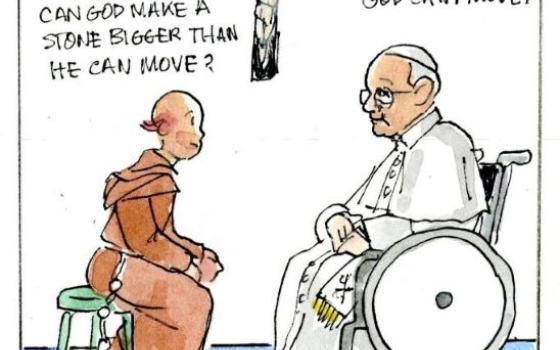LONDON -- If there were any doubt that the battle against a secular “dictatorship of relativism” would be Benedict XVI’s top priority during his Sept. 16-19 trip to the United Kingdom, the pontiff has swiftly removed it.
Benedict picked the U.K. as an important front in that war not merely because it is itself a thoroughly secular society, but also because English culture has a global reach. The British media are followed around the world, and the Commonwealth of Nations, composed of former elements of the British Empire, embraces some two billion people.
In his remarks to Queen Elisabeth II this morning at Holyrood Palace in Edinburgh, Scotland, the pope warned against “aggressive forms of secularism” which no longer value, or even tolerate, religious voices in public life.
In effect, Benedict’s strategy appears to be to turn the secular dogma of tolerance against secular culture, arguing that religious believers too deserve a place at the table.
The pope urged the U.K. not to forget “the Christian foundation” of its culture, which he said “underpins its freedoms.” The pope implied that clarity about foundations is especially important as the U.K. becomes an ever more “modern and multicultural society.”
During an open-air Mass this afternoon in Glasgow, Scotland, Benedict became even more explicit.
“The evangelization of culture is all the more important in our times, when a a ‘dictatorship of relativism’ threatens to obscure the unchanging truth about man’s nature, his destiny and his ultimate good,” the pope said, reviving arguably the most famous sound-bite expressing the pope’s critical view of post-modern secular culture.
Benedict XVI first coined the expression “dictatorship of relativism” just before the conclave in April 2005 that elected him to the papacy, in a homily for the Mass Pro Eligendo Romano Pontifice, meaning “for the election of the Roman Pontiff.” That homily was widely seen as a manifesto by then-Cardinal Joseph Ratzinger outlining what he saw as the central challenge facing the faith.
Though he may not have consciously intended it this way, it was also seen as a preview of the kind of pope Ratzinger would be.
“How many winds of doctrine have we known in recent decades, how many ideological currents, how many ways of thinking,” Ratzinger said on that occasion.
“The small boat of the thought of many Christians has often been tossed about by these waves - flung from one extreme to another: from Marxism to liberalism, even to libertinism; from collectivism to radical individualism; from atheism to a vague religious mysticism; from agnosticism to syncretism and so forth,” he said. “Every day new sects spring up, and what St Paul says about human deception and the trickery that strives to entice people into error comes true.”
“We are building a dictatorship of relativism that does not recognize anything as definitive and whose ultimate goal consists solely of one's own ego and desires,” Ratzinger warned.
Now as pope, Benedict returned to the theme today in his homily at Bellahouston Park.
“There are some who now seek to exclude religious belief from public discourse, to privatize it or even to paint it as a threat to equality and liberty,” the pope said. “Yet religion is in fact a guarantee of authentic liberty and respect, leading us to look upon every person as a brother or sister.”
What effect Benedict’s appeal may have remains to be seen, but he’s inarguably chosen a fitting place to launch it.
According to research by David Voas of the University of Manchester, a child born into a two-parent household in Great Britain today in which both parents are actively religious has only a 47 percent chance of becoming religious him- or herself. If only one parent is religious, the odds drop to 24 percent; if neither parent is religion, the odds of raising a religious child plummet to a statistically insignificant 3 percent.
Voas draws the obvious conclusion: “In Britain, institutional religion now has a half-life of one generation.”
[John L. Allen, Jr. is NCR senior correspondent.]
John Allen will be filing reports throughout the Papal visit to the U.K. Sept. 16-19. Stay tuned to NCR Today for updates.




